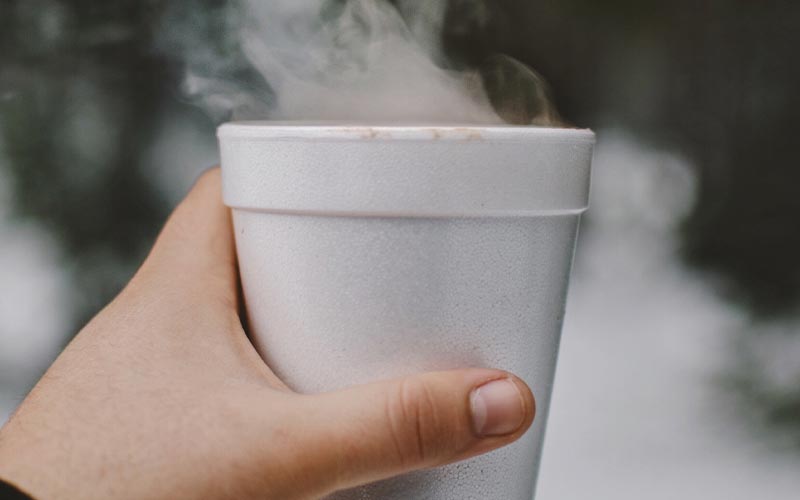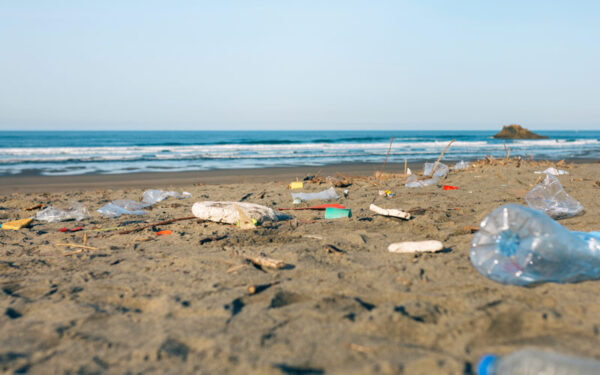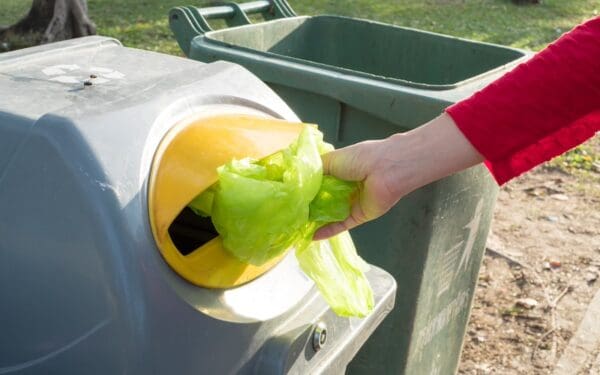
Coffee retailers are ditching polystyrene foam cups, but their alternative – plastic-lined paper cups – is a false solution. Photo: Caleb Lucas on Unsplash
After decades of warnings about the various health and environmental risks linked to polystyrene foam, corporate America is just now lending an ear. While some restaurants and coffee shops were quick to swap out polystyrene foam cups for paper ones, others have reacted more slowly – including coffee and donut giants, Honey Dew and Dunkin’. This fall, both companies announced that they are making the switch from polystyrene foam cups to eco-friendly paper ones.
As these companies seek praise for something they should have done years ago, we wish they had skipped over paper cups altogether and instead adopted reusable cup systems. After all, paper coffee cups aren’t just paper – their interior is lined with plastic, which means they’re not actually recyclable. What’s more, they’re still designed to be used only once before getting tossed in the trash, where they’ll end up in a landfill or incinerator, bringing a host of health and environmental risks to the forefront.
And we can’t forget about those plastic coffee cup lids – they’re made from number six plastic – the same plastic used to make polystyrene foam, meaning they’re just as toxic.
Companies may say switching out polystyrene foam cups for paper ones is a better option, but it’s ultimately not the solution. With 4,200 locations in New England alone (and more than 12,000 worldwide), Dunkin’, in particular, has missed an opportunity to show global leadership in the fight against waste and pollution.
You Should Never Eat or Drink Anything from a Foam Container
It’s no secret that polystyrene foam is hazardous. Derived from dangerous chemical compounds styrene and benzene, the petroleum-based substance is linked to a number of health issues. Even limited exposure to these chemicals can irritate the gastrointestinal and upper respiratory tracts, while high exposure can impair the central nervous system, alter vision, and even cause cancer.
These chemicals can also seep into the food and drinks we store in foam containers, putting us at a greater risk for contracting these illnesses. That means each time we take a big swig of coffee out of that foam cup, or through that plastic lid, we may also be consuming styrene and other harmful toxins.
So, the next time you’re offered a foam cup of steaming hot coffee, or a paper cup with a plastic lid, do me a favor and say no. Better yet, start carrying a reusable coffee mug with you!
Companies are Greenwashing the Paper Coffee Cup
Citing environmental concerns, many companies have ditched polystyrene foam cups for “eco-friendly” paper ones. But are these paper coffee cups – the ones you toss in the recycling bin after your last sip of caffeinated goodness – really that much better for public health and the environment? The answer is no – and here’s why:
If it’s lined with plastic, it can’t be recycled.
The majority of paper coffee cups have a plastic resin coating to keep the cup durable when filled with liquid. But this coating prevents the cup from being recyclable. For a plastic-lined paper coffee cup to truly be recycled, the paper and plastic would need to be separated from one another and sorted into groups of identical materials.
Although it’s possible to recycle plastic-lined paper cups, the process is too expensive to be adopted widely. As a result, the actual recycling of plastic-lined coffee cups is practically non-existent in the U.S.
What’s more, because most of us believe paper coffee cups are recyclable, we throw them into curbside recycling bins, where they get mixed in with other materials – like glass and aluminum – at recycling facilities. A stray paper coffee cup in a load of aluminum can drastically lower the value of that material on the market.
Even if made entirely from paper, it’s still trash.
A number of companies have been working to develop plastic-free paper coffee cups. This may sound like a great option up front – a cup made from 100-percent paper is in fact recyclable – but it is still a disposable item, and that’s not sustainable.
Worldwide, 2.25 billion cups of coffee are consumed daily. Even if only half of those were served in disposable cups, that’s over a billion coffee cups being thrown out each day.
Some would argue that compostable coffee cups and lids would be a better option. But we don’t have a robust enough composting system in New England – or the country – to handle this amount of paper coffee cups alone. Even still, the process to manufacture, compost, or recycle these cups is expensive and consumes an enormous amount of resources – especially for something that is just going to end up in our waste stream. We have better options.
Reuse Systems are the Real Solution
Instead of swapping out one unnecessary evil for another, we can – and should – be investing in reuse systems. A prime example is Vessel, the country’s first reusable cup service based in Berkley, California, and Boulder, Colorado. Similar to a bike-share program, Vessel provides customers with an insulated stainless steel to-go cup that they can refill at participating cafes. Once signed up, you have five days to use the cup before returning it to a Vessel kiosk or partner cafe.
Similarly, Blue Bottle Coffee recently announced that all of its U.S. cafes will be zero waste by the end of 2020. With a goal to divert 90 percent of waste from landfills, the company unveiled a plan that provides consumers with two choices: to bring our own reusable mugs or to put a deposit down on Blue Bottle’s reusable alternatives. The company also vowed to stop selling single-use bags of whole beans and instead allow customers to buy in bulk.
Disrupting the disposables industry, Vessel and Blue Bottle Coffee will keep hundreds of paper and plastic cups out of landfills and incinerators.
A Missed Opportunity
We’re glad Honey Dew and Dunkin’ are tossing polystyrene foam cups aside, but their alternative – plastic-lined paper cups – is a false solution. Both companies missed an opportunity to turn the coffee retail industry on its head by implementing reusable cup systems. Not only would a move like this have set an example for coffee retailers nationally (and globally), but it would have demonstrated a true concern for consumer health and the environment.
It’s evident that reusable cup systems are the way of the future, so let’s give coffee retailers – like Honey Dew, Dunkin’, Starbucks, and Caffé Nero – a push in the right direction. Call on these coffee retailers, as well as your other favorite coffee locales, to ditch plastic-lined paper cups and implement reusable cup programs. It’s time for the reusable cup revolution.




